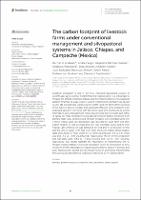Mostrar el registro sencillo del ítem
The carbon footprint of livestock farms under conventional management and silvopastoral systems in Jalisco, Chiapas, and Campeche (Mexico)
| dc.contributor.author | Vega-Fonseca, Andrés | |
| dc.contributor.author | Martínez-Salinas, María Alejandra | |
| dc.contributor.author | Villanueva-Najarro, Cristobal | |
| dc.contributor.author | Jimenes-Trujillo, Jose Antonio | |
| dc.contributor.author | Betanzos Simon, Juan Edduardo | |
| dc.contributor.author | Pérez-Sánches, Edwin | |
| dc.contributor.author | Sepulveda, Claudia | |
| dc.date.accessioned | 2025-05-15T01:53:20Z | |
| dc.date.available | 2025-05-15T01:53:20Z | |
| dc.date.issued | 2024-05-23 | |
| dc.identifier.uri | https://repositorio.catie.ac.cr/handle/11554/12816 | |
| dc.description.abstract | Livestock production is one of the most important agricultural sources of greenhouses gasses (GHG). Transforming the livestock sector is a critical task to mitigate the effects of climate change, and the implementation of silvopastoral systems (SPS) may be a way to do so. Carbon footprint (CF) estimation was carried out for 131 conventional livestock farms (CONF) and SPS farms (SPSF) selected in the states of Jalisco, Chiapas and Campeche (Mexico). GHG emissions were estimated based on interviews with the farmers and farm monitoring to collect information about management, milk production and the live weight gain (LWG) of calves (for meat production) using national emission factors. Emissions from animals, fossil fuels, electricity and nitrogen fertilizers were estimated using Tier I and II criteria. Land use distribution was recorded for each farm, and their carbon fixation in total biomass and soils was estimated using studies from tropical Latin America. CF was estimated for area and for production of milk and the LWG of calves. SPSF had lower GHG emissions, higher carbon fixation rates and a better CF than CONF (5.7 vs. 8.0 t CO2e/ha/year; 6.9 vs. 5.5 t C/ha/year and − 5.0 vs. −2.9 t CO2e/ha/year, respectively). The CF of milk production and calf LWG were − 68.6 to −4.6 kg CO2e/kg and − 3.2 to −0.1 t CO2e/kg, respectively. Our results highlight the importance of implementing SPS to mitigate climate change in livestock production, given its contribution to GHG emissions and the importance of capturing atmospheric carbon in biomass and soils. National and regional policies should focus on promoting implementing SPS as an active and effective strategy for improving CF in livestock farms. | es_ES |
| dc.format.extent | 12 páginas | es_ES |
| dc.language.iso | en | es_ES |
| dc.publisher | Frontiers | es_ES |
| dc.relation.ispartof | Frontiers in Sustainable Food Systems | es_ES |
| dc.relation.uri | https://doi.org/10.3389/fsufs.2024.1363994 | es_ES |
| dc.subject | Biomass | es_ES |
| dc.subject | Greenhouse gasses | es_ES |
| dc.subject | Mitigation | es_ES |
| dc.subject | Land use systems | es_ES |
| dc.subject | Carbon capture | es_ES |
| dc.subject.other | Sede Central | es_ES |
| dc.title | The carbon footprint of livestock farms under conventional management and silvopastoral systems in Jalisco, Chiapas, and Campeche (Mexico) | es_ES |
| dc.type | Artículo | es_ES |
| dc.identifier.status | openAccess | es_ES |
| dc.subject.sdg | ODS 12 - Producción y consumo responsables | es_ES |
| dc.subject.sdg | ODS 13 - Acción por el clima | es_ES |


